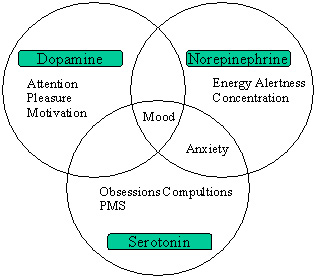|
|
|
Home >
Anti-aging Research > Norepinephrine
Norepinephrine (adrenaline)
Related Topics:
Medications that may increase norepinephrine:
Supplements that may increase norepinephrine:
General Information:
| Neurotransmitters in Various Disorders: |
News & Research:
-
Depression Protocol - Life Extension Foundation -
"Tyrosine is used by the body to make the neurotransmitters dopamine,
norepinephrine, and epinephrine, which play a role in elevating mood and
keeping us alert; 500 to 1500 mg a day is recommended"
-
Is
Exercise the Best Drug for Depression - Time Magazine, 6/19/10 -
"depressed adults who participated in an aerobic
exercise plan improved as much as those treated with sertraline, the drug
that was marketed as Zoloft ... Subsequent trials have repeated these
results, showing again and again that patients who undergo aerobic exercise
regimens see comparable improvement in their depression as those treated
with medication, and that both groups do better than patients given only a
placebo ... exercise may alter brain chemistry in much the same way that
antidepressant drugs do — regulating the key neurotransmitters serotonin and
norepinephrine"
-
The
Ginkgo biloba extract EGb 761((R)) and its main constituent flavonoids and
ginkgolides increase extracellular dopamine levels in the rat prefrontal
cortex - Br J Pharmacol. 2010 Jan 25 - "A single
oral dose of EGb 761 (100 mg.kg(-1)) had no effect on monoamine levels.
However, following chronic (100 mg.kg(-1)/14 days/once daily) treatment, the
same dose significantly increased extracellular dopamine and noradrenaline
levels, while 5-HT levels were unaffected. Chronic treatment with EGb 761
showed dose-dependent increases in frontocortical dopamine levels and, to a
lesser extent, in the striatum. The extracellular levels of HVA and DOPAC
were not affected by either acute or repeated doses. Treatment with the main
constituents of EGb 761 revealed that the increase in dopamine levels was
mostly caused by the flavonol glycosides and ginkgolide fractions, whereas
bilobalide treatment was without effect. Conclusions and implications: The
present results demonstrate that chronic but not acute treatment with EGb
761 increased dopaminergic transmission in the PFC. This finding may be one
of the mechanisms underlying the reported effects of G. biloba in improving
cognitive function" - See
Ginkgo biloba at Amazon.com
 . .
-
Functional Roles of Norepinephrine and Dopamine in ADHD - Medscape,
3/9/06
- Sex, Sexuality, and
Serotonin - Medscape, 7/20/04 -
"From our study of the brain, we have some nice
evidence that elevated activity of dopamine is involved in that intense
sense of passion and arousal of romantic love. I also maintain in my book,
Why We Love, that we're going to find out sometime that norepinephrine is
also involved, largely because heightened activity of norepinephrine is also
associated with focused attention, elevated energy, motivation to win a
reward, elation, and 2 characteristics of romantic love -- obsessional
following and object imprinting ... low activity levels of serotonin are
going to be involved"
-
Adrenaline Packs A Powerful Punch In The Use Of Antidepressants -
Science Daily, 6/7/04
-
Depression, The Mind Body Connection - Physician's Weekly, 2/16/04 -
"People who are depressed are likely to have
norepinephrine abnormalities; the proper functioning of blood macrophages is
dependent upon health norepinephrine"
- Hormones for
Perimenopausal and Postmenopausal Depression - Psychiatric Times, 1/04 -
"Estrogen inhibits
MAO, thereby diminishing the degradation of norepinephrine and
serotonin and thus increasing their activity, while progesterone has the
reverse impact on MAO"
- Non-Stimulant
Approved for ADHD - WebMD, 11/26/02 -
"it affects only one major brain chemical,
norepinephrine -- thought to be important in regulating attention,
impulsivity, and activity levels"
- The Neurobiology of
Depression: Focus on Norepinephrine - Medscape, 11/21/02
- New
Antidepressant [Cymbalta] Works Faster - WebMD, 11/11/02 -
"Cymbalta affects two different brain chemical
messengers -- serotonin and norepinephrine"
-
Chronic Therapy with Beta-Adrenergic Receptor Blockers Improves Endothelial
Function in Patients with Chronic Heart Failure - Doctor's Guide,
9/30/02 -
"Plasma norepinephrine levels decreased from 591
pg/mL before treatment to 426 pg/mL after six months of
beta-blockade" - So does that mean beta-blockers can cause
depression?
- Which
Antidepression Drug Is Best? - WebMD, 4/30/02 -
"As initial therapy for
depression, most doctors tend to use newer drugs that target a specific
brain chemical -- serotonin -- involved in
depression. These drugs, called selective serotonin reuptake inhibitors or
SSRIs
... Effexor does this, too, but
it isn't quite as specific. It also increases the amount of another chemical
-- norepinephrine -- in the brain ... Those who received Effexor were 43%
more likely to have their depression go into remission than those taking
SSRIs"
-
St. John's Wort: Effective, with Caveats - Nutrition Science News, 3/02
-
"Using the Hamilton Rating Scale for Depression, 47
percent of those taking
St. John's wort improved compared with 40
percent of those taking the
sertraline ... Hyperforin increases the effectiveness of norepinephrine,
dopamine, L-glutamate, and gamma-amino butyric acid (GABA), as well as
serotonin. Researchers in the Department of Pharmacology at the
University of Frankfurt in Germany concluded, "no other antidepressant
compound exhibits a similar broad uptake-inhibiting profile.""
-
Happily ever after? It's all in your head - CNN, 2/14/02 - See the
video. Claims that love is dependent on a cocktail of chemicals (dopamine,
norepinephrine and
PEA) and that oxytocin is responsible for
bonding and that
vasopressin is responsible for monogamy.
- Doctors Target
Two Brain Chemicals to Treat Depression, Anxiety - WebMD, 9/17/01 -
"Prozac works by increasing the availability of the
mood chemical serotonin, while Effexor targets serotonin and norepinephrine,
another brain chemical that plays a role in anxiety and depression ...
there's a whole series of other studies in the area of anxiety disorders and
new medications that are in development that target both brain chemicals ...
One such drug, Remeron, is currently available"
| Neurotransmitter Regulation of Mood, Cognition, and Behavior |

Stahl. Essential Psychopharmacology 1996 Foote. Psychopharmacology 1995. |
70302
|
|

